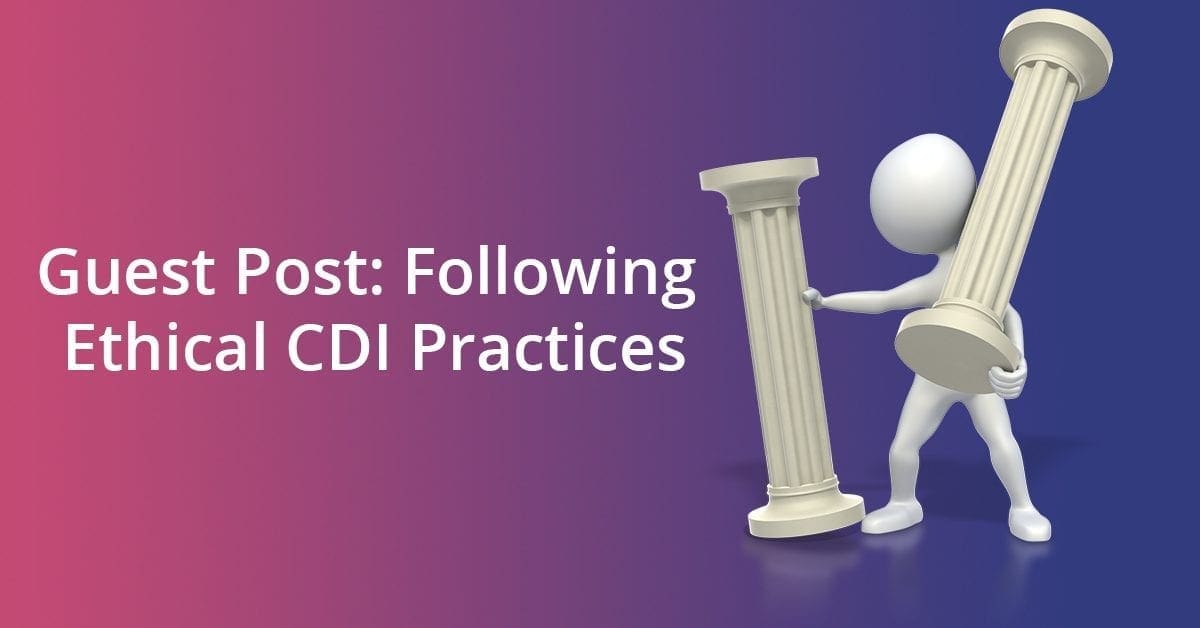Call us toll-free: 800-878-7828 — Monday - Friday — 8AM - 5PM EST

By Cathy Farraher, RN, MBA, CCM, CCDS for ACDIS CDI Blog
Ethics. My favorite topic! Being a hopelessly optimistic and naïve person, I am often surprised by unethical behavior. I have seen it in management and employees alike, and it always comes as a shock. Once I have identified this behavior in an individual, they always remain under scrutiny in my mind, but the initial presentation of bad behavior usually throws me for a loop.
People rise to the level of competence or incompetence they are allowed. Generally, questionable unethical behavior falls into two categories—either the person is disgruntled and feels they no longer need to behave ethically or the leadership/community of professionals surrounding him/her exhibits such behavior and so it becomes part of the professional culture.
The first is easier to solve/resolve than the second, particularly when it comes to CDI practices. A manager/director can spot an unethical staff member through ongoing audits of their work, through regular team or one-on-one meetings, and work to uncover the underlying reason for his/her dissatisfaction. Identifying the problem, may result in opportunities for shift in workload to something which better suits that individual’s needs.
For example, if a CDI specialist has been on the job for a few years and still sees the program’s mission as based in financial outcomes they may become frustrated, feeling the stagnation of their professional development. They may begin to only query for MCCs or leave leading queries in order to capture higher-weighted DRGS since “that’s all the facility cares about.” By sharing alternative program metrics with such an individual and offering him/her additional training to conduct more advanced reviews, such as clinical validation, the program keeps a previously valued employee, saves itself from compliance concerns, and meets the needs of expanded focus.
The second is more difficult, as it requires an overarching shift in program focus and administrative support for CDI efforts. If CDI program managers become frustrated with the financial-only focus and cannot seem to make headway with their administrative teams on alternative options and staffing, they may choose to dissect their data to show only those points which support the supposed needs of administrators and trickle that dissatisfaction out to their team. Savvy administrators can leverage materials such as survey data and benchmarking reports as well as white papers and position papers from ACDIS and other organization to help prove the case for expansion.
To start with, to behave in an ethical manner related to the CDI role, staff need to ensure each review is the most accurate it can be. If you have no experience with the subject matter you are reviewing, research it, educate yourself, seek assistance from colleagues, or recuse yourself if this isn’t possible.
I personally have been in this situation, having taken on review of special care nursery patients, which I discussed in a 2018 article for the CDI Journal. I have extensive clinical experience in a level-one trauma center, but never once took care of a hospitalized infant. Before I began my first review, I spent quite a bit of time familiarizing myself with diagnoses and clinical scenarios in order to determine what was par for the course versus a condition which required additional specificity. I met with the department chair to ask additional questions and to educate her on CDI program and she on the nuances of her unit. The end result was very successful. But it couldn’t have been done ethically without my obtaining the knowledge that I lacked prior to beginning reviews, even though it did require time spent without querying.
It’s all about the final product, not just number of reviews and number of queries sent. Those seeking additional information about ethical practices should definitely take a look at the ACDIS Code of Ethics including the case scenarios and how to apply to code sections.
